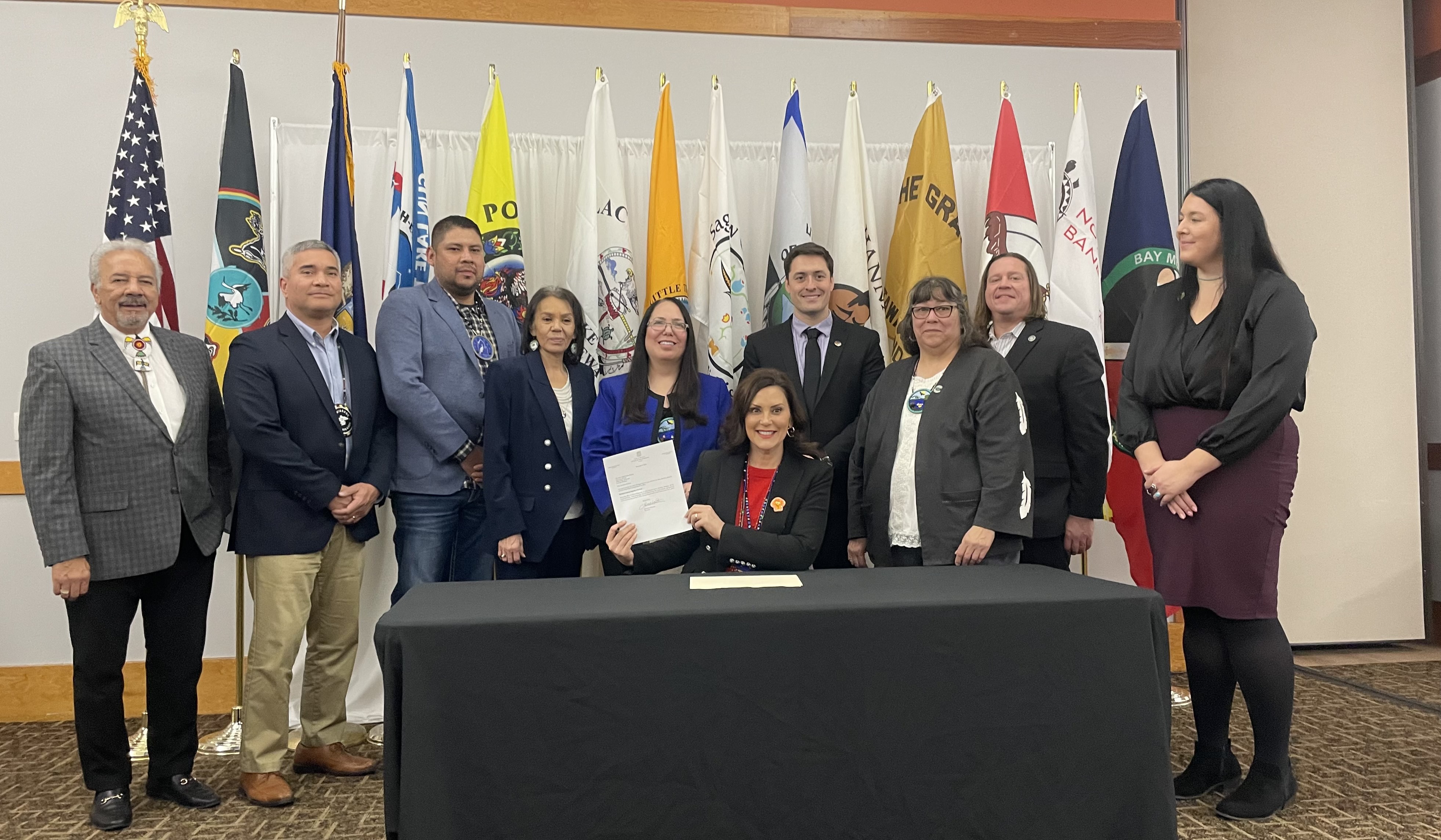
- Details
- By Native News Online Staff
SAULT STE. MARIE, Mich. — Michigan Governor Gretchen Whitmer held a tribal summit with leaders from the 12 federally recognized tribes in Michigan at the Sault Ste. Marie Tribe of Chippewa Indians’ Kewadin Casino Resort in Sault Ste. Marie, Mich. on Tuesday.
The annual summit brings together tribal leaders with various state government officials from various departments and agencies that deal directly with tribes on an ongoing basis. The highlight of the summit is the meeting with the governor.
Prior to the afternoon summit, Whitmer met individually with representatives of each of the tribes to discuss matters important to them.
“It was an honor to attend the Tribal Summit in the Sault,” Governor Whitmer said in a statement. “The State of Michigan and sovereign tribal nations must continue working together on our shared priorities and maintain an open, productive dialogue to get things done on the kitchen-table issues. I am committed to working alongside Tribal leaders to make a real difference in people’s lives and continue growing our economies. Our fortunes are linked, and we must collaborate to move our nations forward.”
Want more Native News? Get the free daily newsletter today.
In Governor Whitmer’s first year in office, she signed Executive Directive 2019-17, which reaffirms and extends Michigan’s commitment to recognizing the sovereignty and right of self-governance of Michigan’s federally-recognized tribes and orders each state department and agency to adhere to these principles. It’s the first executive directive in the state’s history to require training on tribal-state relations for all state department employees who work on matters that have direct implications for tribes and required each department and agency to adopt and implement a tribal consultation policy.
Additionally, Governor Whitmer has shown a deep commitment to ensuring members of Michigan’s federally recognized tribes have a seat at the table in state government. She has appointed 44 Native Americans to judgeships, councils, boards and commissions. One of those appointees, Bryan Newland, was sworn in as Assistant Secretary of the Interior for Indian Affairs last year, where he serves Native communities nationwide alongside Secretary Deb Haaland.
More Stories Like This
Native News Weekly (August 25, 2024): D.C. BriefsUS Presidents in Their Own Words Concerning American Indians
Native News Weekly (January 18, 2026): D.C. Briefs
Federal Judge Orders ICE to Halt Use of Pepper Spray, Arrests of Peaceful Protesters in Twin Cities
Tunica-Biloxi Cultural Leader John D. Barbry Walks On
Help us defend tribal sovereignty.
At Native News Online, our mission is rooted in telling the stories that strengthen sovereignty and uplift Indigenous voices — not just at year’s end, but every single day.
Because of your generosity last year, we were able to keep our reporters on the ground in tribal communities, at national gatherings and in the halls of Congress — covering the issues that matter most to Indian Country: sovereignty, culture, education, health and economic opportunity.
That support sustained us through a tough year in 2025. Now, as we look to the year ahead, we need your help right now to ensure warrior journalism remains strong — reporting that defends tribal sovereignty, amplifies Native truth, and holds power accountable.
 The stakes couldn't be higher. Your support keeps Native voices heard, Native stories told and Native sovereignty defended.
The stakes couldn't be higher. Your support keeps Native voices heard, Native stories told and Native sovereignty defended.
Stand with Warrior Journalism today.
Levi Rickert (Potawatomi), Editor & Publisher

